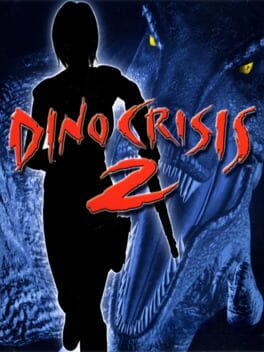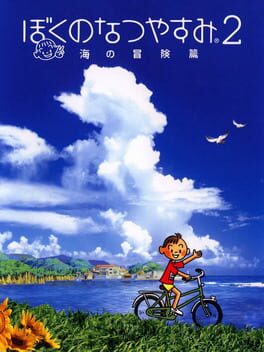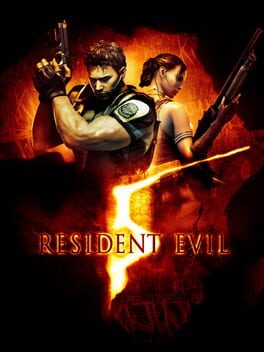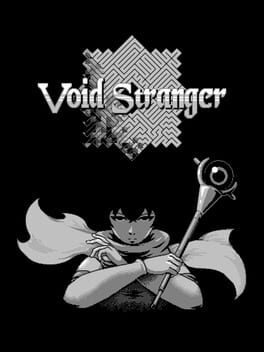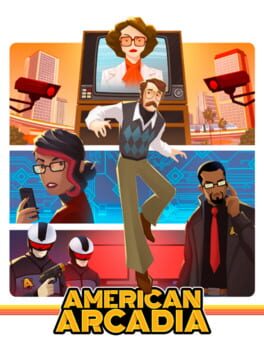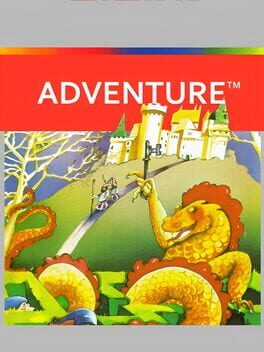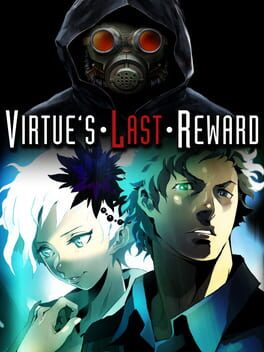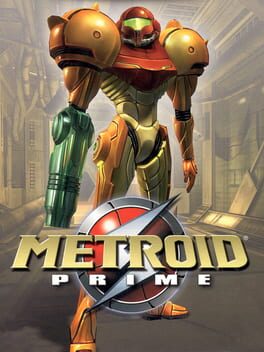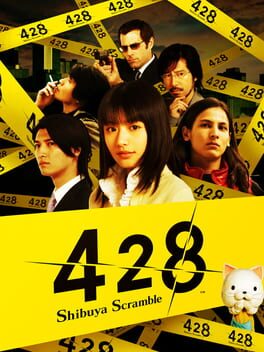megahouten
334 Reviews liked by megahouten
DoDonPachi DaiOuJou
2002
It's not that hard to make a bullet hell that puts you on the tightrope, much less a difficult one. It's enough to fill the screen of bullets with any excuse, the natural reaction will be to feel overwhelmed looking for the few safe spots at hand. What is hard to do is to achieve this level of creativity and elegance.
It is not only that DaiOuJou is the summit (or at least one of them) of a very specific style (danmaku) developed by a very specific circle (CAVE, starting from the impulse left by Toaplan and other descendants such as Raizing or Takumi) or a very specific person (Tsuneki Ikeda, who had been defining his style here for more than a decade since his beginnings in Toaplan), but it is a nonstop of ideas that, always maintaining a stylistic cohesion, keep each playthrough fresh because of its radical approach variations.
Something as simple, satisfying and seen afterwards as the sequence of giant enemies constantly canceling bullets when destroyed here is nothing more than a section of a level. Getting across between bullets, an easy method to achieve tension as seen in Mushihimesama Futari, a game a bit exceeding in this resource, achieves elegance by building on varied layers of bullet sweeps. A clear example is the wasp section of the fifth level. Not only stands out because of making the small enemies follow a very peculiar rail movement, or because of their alternative appearances covering the entire width of the game, or because of being protected by giant wasps that serve as a shield and as another layer of bullets to the obstacle course, but stands out because of the creativity and care of the whole. Because of having to rethink a new strategy when everything seemed under control.
The slightly superior Black Label version also enhances one of the greatest virtues of the original game that represents its philosophy very well: the hyper. A double-edged weapon that allows you to deal more damage and cover more screen in exchange of increasing the speed and cadence of enemy bullets, a mechanic that in this revision appears more frequently, encouraging to risk and improvise, the moments where the spirit of the style truly shines.
Of course, it could be criticized that the CAVE or Ikeda ideas are conservative, and even that they have given birth to descendants incapable of innovating making certain rules as unbreakable laws. However, to me it is not an accurate criticism. The fear, inexperience or ineptitude of some when it comes to achieving their own style or such a level of elegance is not the fault of the original inspiration, and the obsessive reiteration of an author or a circle on the same philosophy is far from the easily confused repetition for comfort and security. If anything, what is interesting about the style that culminates here, and that would attempt to reach the general public in later games, is giving everything for a genre lost in an arcade style that was already considered little more than a relic. Knowing that few were going to play and even fewer comprehend.
If what we want is the rare maturity in the medium of someone capable of working their style until it becomes unique, robust and unrecognizable from the influences that germinated it, like the style of Toaplan of which there is no trace left, DoDonPachi DaiOuJou is nothing but one of the clearest examples.
It is not only that DaiOuJou is the summit (or at least one of them) of a very specific style (danmaku) developed by a very specific circle (CAVE, starting from the impulse left by Toaplan and other descendants such as Raizing or Takumi) or a very specific person (Tsuneki Ikeda, who had been defining his style here for more than a decade since his beginnings in Toaplan), but it is a nonstop of ideas that, always maintaining a stylistic cohesion, keep each playthrough fresh because of its radical approach variations.
Something as simple, satisfying and seen afterwards as the sequence of giant enemies constantly canceling bullets when destroyed here is nothing more than a section of a level. Getting across between bullets, an easy method to achieve tension as seen in Mushihimesama Futari, a game a bit exceeding in this resource, achieves elegance by building on varied layers of bullet sweeps. A clear example is the wasp section of the fifth level. Not only stands out because of making the small enemies follow a very peculiar rail movement, or because of their alternative appearances covering the entire width of the game, or because of being protected by giant wasps that serve as a shield and as another layer of bullets to the obstacle course, but stands out because of the creativity and care of the whole. Because of having to rethink a new strategy when everything seemed under control.
The slightly superior Black Label version also enhances one of the greatest virtues of the original game that represents its philosophy very well: the hyper. A double-edged weapon that allows you to deal more damage and cover more screen in exchange of increasing the speed and cadence of enemy bullets, a mechanic that in this revision appears more frequently, encouraging to risk and improvise, the moments where the spirit of the style truly shines.
Of course, it could be criticized that the CAVE or Ikeda ideas are conservative, and even that they have given birth to descendants incapable of innovating making certain rules as unbreakable laws. However, to me it is not an accurate criticism. The fear, inexperience or ineptitude of some when it comes to achieving their own style or such a level of elegance is not the fault of the original inspiration, and the obsessive reiteration of an author or a circle on the same philosophy is far from the easily confused repetition for comfort and security. If anything, what is interesting about the style that culminates here, and that would attempt to reach the general public in later games, is giving everything for a genre lost in an arcade style that was already considered little more than a relic. Knowing that few were going to play and even fewer comprehend.
If what we want is the rare maturity in the medium of someone capable of working their style until it becomes unique, robust and unrecognizable from the influences that germinated it, like the style of Toaplan of which there is no trace left, DoDonPachi DaiOuJou is nothing but one of the clearest examples.
Dino Crisis 2
2000
To be honest, I didn't exactly come in with my arms wide open. The fears of a formally continuist sequel of something that was very expressive because its own peculiar use of its forms increased shortly after starting. A setting to choose how long you want the day to be, collectibles around the map, a character that tells you where to see the events of each day, afraid of giving you back freedom in a larger world, overall details that seem treated with less care and a feeling of experiencing the same but worse. It's a shame that every time the game tries to awkwardly recall the intentions of its predecessor, it pales considerably (one clear instance: the previously essential narrator is now dispensable in the few arbitrary moments it appears).
Luckily, it takes just a few days to see that the direction taken is right. The facts that the protagonist's father never appears, that the plot of the future sibling remains in the background, or that the reminiscing aspect of the tale is anecdotic are no coincidence. The form, weighed down by losing part of its meaning, becomes a perfect vehicle to explore a more passive exploration of the surrounding drama.
Here Boku does not so much embody a reflexive portrait of childhood and growth, as he is more a supporting device for the rest of the cast. Accordingly, the most dramatically charged plots revolve less around Boku's family and more around the neighbors and visitors. These take advantage of the kid's innocent and outsider approach to deal with a common yet always specific issue: yearn. Yearn because of the distance between mother and daughter, between father and son, between lovers, between Earth and outer space, between past and present and future, between the world of humans and the one that is not ours, between life and what lies beyond. And the fears that all of these yearnings may never be answered.
That most of the conflicts end up in an open ended bittersweet quiet note resonates with the setting of the small coastal village. A place to get away from and to be taken away from the world. The ever-present sound of the waves, which inevitably move these desires in the tide just as the moon changes phase in the last shot of each day.
It’s not that Boku's appearance solves all these yearnings, but his mere interest in observing the world around him and serving as a confessional escape mechanism at least alleviates the pain. The game takes a passive stance where listening to one another is the greatest act of kindness, where what little evil appears to exist in the world has nothing but a noble and melancholic origin. Who knows what the future may hold, what to do but to hope for the best and reach for our hands within the tide.
Luckily, it takes just a few days to see that the direction taken is right. The facts that the protagonist's father never appears, that the plot of the future sibling remains in the background, or that the reminiscing aspect of the tale is anecdotic are no coincidence. The form, weighed down by losing part of its meaning, becomes a perfect vehicle to explore a more passive exploration of the surrounding drama.
Here Boku does not so much embody a reflexive portrait of childhood and growth, as he is more a supporting device for the rest of the cast. Accordingly, the most dramatically charged plots revolve less around Boku's family and more around the neighbors and visitors. These take advantage of the kid's innocent and outsider approach to deal with a common yet always specific issue: yearn. Yearn because of the distance between mother and daughter, between father and son, between lovers, between Earth and outer space, between past and present and future, between the world of humans and the one that is not ours, between life and what lies beyond. And the fears that all of these yearnings may never be answered.
That most of the conflicts end up in an open ended bittersweet quiet note resonates with the setting of the small coastal village. A place to get away from and to be taken away from the world. The ever-present sound of the waves, which inevitably move these desires in the tide just as the moon changes phase in the last shot of each day.
It’s not that Boku's appearance solves all these yearnings, but his mere interest in observing the world around him and serving as a confessional escape mechanism at least alleviates the pain. The game takes a passive stance where listening to one another is the greatest act of kindness, where what little evil appears to exist in the world has nothing but a noble and melancholic origin. Who knows what the future may hold, what to do but to hope for the best and reach for our hands within the tide.
Resident Evil 5
2009
Normally, thinking about a sequel to Resident Evil 4 is thinking it to be as simple as copying the system again and being done, how could a bad game come out of there? Even better, smooth the system to focus on combat: more melee options and dynamic inventory management limited on what's important without stopping the action.
Turns out that it was also important to know how to design and place enemies and scenarios, to be put against the ropes depended not only on the system but in always feeling surrounded and having to reposition constantly. Because of this, Resident Evil 5 starts by looking at some of the best ideas of 4, the moment inspired by the first raid at the village appears shortly in an open survival arena where enemies will keep appearing. Obviously, it's a highlight, nothing more is needed to feel constantly cornered.
The way is lost at every other moment. Whether it's trying to take advantage of splitting up and covering your backs in co-op, fighting in a cramped incinerator against a monster almost immune to gunfire, or navigating the dark of the mines, the game doesn't come even close to the tension of its predecessor. On top of that, the slapstick tone is much more blurred, seeming almost accidental, as in the possibility to melee combo some enemies together with your partner. Casual exceptions aside, the hits have lost impact and the cinematography style, there is an identity crisis due to a mishmash of trends of the period between military shooter, giant aliens from Gears of War and Matrix scenes that do not fit at all with what Resident Evil 4 was. It seems that it wasn't as simple as replicating a system and hoping that everything else could hold up.
It's no surprise then that the best part is the mercenaries mode. If Resident Evil 5 looks at the village raid to build its best moment right out of the gate, it can also look at the mercenaries mode derived from that sequence. Here disappears the clumsiness of trying to confusingly replicate without understanding and without genius. It goes the roughest way, to survive enemy waves in the system that could not fail, even with the Frankenstein erratic mashups still well in sight.
Turns out that it was also important to know how to design and place enemies and scenarios, to be put against the ropes depended not only on the system but in always feeling surrounded and having to reposition constantly. Because of this, Resident Evil 5 starts by looking at some of the best ideas of 4, the moment inspired by the first raid at the village appears shortly in an open survival arena where enemies will keep appearing. Obviously, it's a highlight, nothing more is needed to feel constantly cornered.
The way is lost at every other moment. Whether it's trying to take advantage of splitting up and covering your backs in co-op, fighting in a cramped incinerator against a monster almost immune to gunfire, or navigating the dark of the mines, the game doesn't come even close to the tension of its predecessor. On top of that, the slapstick tone is much more blurred, seeming almost accidental, as in the possibility to melee combo some enemies together with your partner. Casual exceptions aside, the hits have lost impact and the cinematography style, there is an identity crisis due to a mishmash of trends of the period between military shooter, giant aliens from Gears of War and Matrix scenes that do not fit at all with what Resident Evil 4 was. It seems that it wasn't as simple as replicating a system and hoping that everything else could hold up.
It's no surprise then that the best part is the mercenaries mode. If Resident Evil 5 looks at the village raid to build its best moment right out of the gate, it can also look at the mercenaries mode derived from that sequence. Here disappears the clumsiness of trying to confusingly replicate without understanding and without genius. It goes the roughest way, to survive enemy waves in the system that could not fail, even with the Frankenstein erratic mashups still well in sight.
Void Stranger
2023
Necesitaría mucho más que unas pocas líneas para intentar describir los altibajos emocionales que Void Stranger me ha provocado. Incomprensión e incomodidad, interés y fascinación, rabia y melancolía, alegría y asombro, y finalmente, un tono agridulce al que me alegro de haber jugado. Por cada piso que pude terminar por mi cuenta, hubo tres que tuve que buscar la solución online; por cada mural que descifré, dos que no hubiera entendido jamás; y por cada escena de culpa católica enmarcada en personajes estereotípicos que me hizo apretar los dientes de la indignación, hubo tres que me hicieron sentir que estaba tocando de verdad al autore.
Decimos que los juegos son obras personales de la misma forma que decimos que detrás de cada obra de arte se sobreentiende siempre cierto esfuerzo y horas de trabajo: como una convención comodona, destinada a reafirmar nuestra decisión de dedicar el poco tiempo que tenemos de vida a un arte que seguramente no posea ni la mitad de humanidad que el poema más parco. Con Void Stranger sentí que experimentaba arte y basura a partes iguales, y en ese sentido, es un juego que me ha hecho pensar más que nunca en mi relación con este medio que me ha traído tantas alegrías y tantas, tantas decepciones.
Puedes admirar Void Stranger por la inquina mentalidad puesta a la hora de diseñar según que puzzles, y puedes detestarlo por su tendencia casi obsesiva a la ofuscación, que en más de una ocasión me hicieron querer cortar del todo. También puedes reconocer su intrincada narración, digna de cierta escuela de diseño post-Undertale que pareció tomar como única lección el accidente de Gaster. Pero para mí, lo que tiene valor de esta maraña de modos extra es el hecho de que, al final del día, el mensaje siempre es el mismo, el de la importancia de aprender a amar. En los momentos en que es así de simple, Void Stranger me agarra de verdad, y en los momentos en que deja relucir sus partes más avergonzadas, es cuando me irrita de verdad.
Así que le pongo un 4, porque supongo que un 5 quedaría reservado para los juegos que me afectan a un nivel estrictamente personal o me parecen encapsulaciones ideales de una forma que no siempre sabré explicar, puedo afirmar sin ninguna duda que hay muchas cosas en Void Stranger que no me gustan. Pero no puedo negar que me ha hecho pensar de un modo que pocas obras, irónicamente desde Undertale, lograron.
--------------------------
I would need much more than a few lines to describe the emotional ups and downs that Void Stranger has provoked in me. Incomprehension and discomfort, interest and fascination, anger and melancholy, joy and wonder, and finally, a bittersweet note that I'm glad I had the opportunity to experience. For every floor I was able to finish on my own, there were three I had to look up the solution online for; for every mural I deciphered, two of them I would never have guessed on my own; and for every scene of Catholic guilt framed by stereotypical characters that made me cringe in indignation, there were three that made me feel like I was really reaching the author.
We say that games are personal works in the same way that there's always some effort put behind everything, in the sense that we use to reaffirm our life choice to devote so much of our precious time on Earth to an art form that probably doesn't have as much humanity within it as the shortest poem. With Void Stranger I felt like I was experiencing art and dreck on several occasions, and in that sense, it is a game that has made me think more about my relationship with a medium that has brought me so much joy and yet so much disappointment than many others.
You can admire Void Stranger for its devilish attitude towards puzzle design, and you can loathe it for its almost obsessive tendency to obfuscation, which made me want to quit it many times. You can also recognize its intricate storytelling, worthy of a post-Undertale school of design that took Gaster's accidental fame as its main bullet point. But for me, what's valuable about this mess of a title is the fact that, at the end of the day, the message remains the same: That of the importance of being loved. When it's that simple, is when it grabs me better. And when it's much more dishonest and shameful is when it really irritates me.
So I give it a 4, because I suppose a 5 should be reserved for games that affect me on a very personal level or encapsulate an ideal form of gaming that I'm not always good at explaining. I can state without a doubt that there are many things in Void Stranger that I don't like. But I can't deny that it has made me think in a way that few works, ironically since Undertale, managed to do.
Decimos que los juegos son obras personales de la misma forma que decimos que detrás de cada obra de arte se sobreentiende siempre cierto esfuerzo y horas de trabajo: como una convención comodona, destinada a reafirmar nuestra decisión de dedicar el poco tiempo que tenemos de vida a un arte que seguramente no posea ni la mitad de humanidad que el poema más parco. Con Void Stranger sentí que experimentaba arte y basura a partes iguales, y en ese sentido, es un juego que me ha hecho pensar más que nunca en mi relación con este medio que me ha traído tantas alegrías y tantas, tantas decepciones.
Puedes admirar Void Stranger por la inquina mentalidad puesta a la hora de diseñar según que puzzles, y puedes detestarlo por su tendencia casi obsesiva a la ofuscación, que en más de una ocasión me hicieron querer cortar del todo. También puedes reconocer su intrincada narración, digna de cierta escuela de diseño post-Undertale que pareció tomar como única lección el accidente de Gaster. Pero para mí, lo que tiene valor de esta maraña de modos extra es el hecho de que, al final del día, el mensaje siempre es el mismo, el de la importancia de aprender a amar. En los momentos en que es así de simple, Void Stranger me agarra de verdad, y en los momentos en que deja relucir sus partes más avergonzadas, es cuando me irrita de verdad.
Así que le pongo un 4, porque supongo que un 5 quedaría reservado para los juegos que me afectan a un nivel estrictamente personal o me parecen encapsulaciones ideales de una forma que no siempre sabré explicar, puedo afirmar sin ninguna duda que hay muchas cosas en Void Stranger que no me gustan. Pero no puedo negar que me ha hecho pensar de un modo que pocas obras, irónicamente desde Undertale, lograron.
--------------------------
I would need much more than a few lines to describe the emotional ups and downs that Void Stranger has provoked in me. Incomprehension and discomfort, interest and fascination, anger and melancholy, joy and wonder, and finally, a bittersweet note that I'm glad I had the opportunity to experience. For every floor I was able to finish on my own, there were three I had to look up the solution online for; for every mural I deciphered, two of them I would never have guessed on my own; and for every scene of Catholic guilt framed by stereotypical characters that made me cringe in indignation, there were three that made me feel like I was really reaching the author.
We say that games are personal works in the same way that there's always some effort put behind everything, in the sense that we use to reaffirm our life choice to devote so much of our precious time on Earth to an art form that probably doesn't have as much humanity within it as the shortest poem. With Void Stranger I felt like I was experiencing art and dreck on several occasions, and in that sense, it is a game that has made me think more about my relationship with a medium that has brought me so much joy and yet so much disappointment than many others.
You can admire Void Stranger for its devilish attitude towards puzzle design, and you can loathe it for its almost obsessive tendency to obfuscation, which made me want to quit it many times. You can also recognize its intricate storytelling, worthy of a post-Undertale school of design that took Gaster's accidental fame as its main bullet point. But for me, what's valuable about this mess of a title is the fact that, at the end of the day, the message remains the same: That of the importance of being loved. When it's that simple, is when it grabs me better. And when it's much more dishonest and shameful is when it really irritates me.
So I give it a 4, because I suppose a 5 should be reserved for games that affect me on a very personal level or encapsulate an ideal form of gaming that I'm not always good at explaining. I can state without a doubt that there are many things in Void Stranger that I don't like. But I can't deny that it has made me think in a way that few works, ironically since Undertale, managed to do.
American Arcadia
2023
Al final de un juego que tiene plataformas de mentira, sigilo de mentira, puzzles de mentira, una trama distópica haciendo críticas de mentira sobre nada, se revela lo obvio. El juego no tiene ni una pizca de esperanza de que las cosas puedan ir a mejor o de que los seres humanos se comporten como tal, y en los créditos se asegura de mostrar que todo intento de su (pobre y falsa) idea de revolución es devorado por el mercado.
Esto se debe a que es un juego devorado por el mercado, por la tendencia, por la mentira, por hacer porque sí, por ser rentable, porque no cree que los humanos tengan nada que hacer por gusto, porque cree que cualquiera se vende o como poco se acaba engatusando por el mal. En esta secuencia de créditos con tono burlón y desesperanzador, el punto de miseria más alto es uno inesperado y accidental. Entre los mensajes de agradecimiento de los desarrolladores, por lo general nada fuera de lo normal, uno de ellos dedica unas palabras muy sentidas a su madre fallecida recientemente. Después de tantas horas de falsedad choca ver un acto tan escondido y tan humano de la nada, que tarda poco en desaparecer de pantalla mientras una versión ensalzada de ironía de la canción recurrente principal sigue sonando, mientras las imágenes de fondo y la escena post créditos se suceden perpetuando que el ser humano no importa y que no tiene capacidad de empatía ni de amor.
Esto se debe a que es un juego devorado por el mercado, por la tendencia, por la mentira, por hacer porque sí, por ser rentable, porque no cree que los humanos tengan nada que hacer por gusto, porque cree que cualquiera se vende o como poco se acaba engatusando por el mal. En esta secuencia de créditos con tono burlón y desesperanzador, el punto de miseria más alto es uno inesperado y accidental. Entre los mensajes de agradecimiento de los desarrolladores, por lo general nada fuera de lo normal, uno de ellos dedica unas palabras muy sentidas a su madre fallecida recientemente. Después de tantas horas de falsedad choca ver un acto tan escondido y tan humano de la nada, que tarda poco en desaparecer de pantalla mientras una versión ensalzada de ironía de la canción recurrente principal sigue sonando, mientras las imágenes de fondo y la escena post créditos se suceden perpetuando que el ser humano no importa y que no tiene capacidad de empatía ni de amor.
The Legend of Zelda
1986
La exaltación de un recuerdo de niñez reavivado en la forma más pura de aventura.
Ante la aparente limitación y la imposibilidad, se elevan la inteligencia (aquello que permite diseñar y unir las piezas que conforman la totalidad de una obra) y la sensibilidad (la capacidad de dotar al conjunto de un impacto y significado mayor) para dar paso a la posibilidad y la maravilla.
Esa unión es la clave para concebir un mundo tan rico como Hyrule: inhóspito, desafiante, pero también intrigante, poético y evocador. En cada una de sus pantallas aguarda una posible historia, un secreto por descubrir, una bifurcación de caminos donde coexiste el desafío de la navegación junto a la tensión del combate para dar como resultado la lucha por la supervivencia, una lucha donde cada acción y decisión importan frente a estas tierras totalmente indiferentes a nosotros.
Es esa indiferencia la que enfatiza el desafío de esta aventura y su naturaleza indómita por medio de la escasez de recursos, de parajes laberínticos, de supervivientes reticentes, de enemigos impredecibles y de misterios que se ocultan a simple vista. Hyrule se resiste a nosotros y, en consecuencia, buscamos prevalecer pese a la adversidad. Todo ello a través de los ojos de un niño como lo es nuestro protagonista, quien, guiado por su sentido de la justicia y armado con su pericia y valor, afronta los peligros de este reino en ruinas doblegado por la barbarie.
Un niño frente al mundo. Parece un esfuerzo fútil, ridículo, casi imposible, pero con cada derrota, con cada descubrimiento y con cada victoria superamos los límites conocidos. Crecemos. Una vez superada la percepción de esos límites, la figura de ese niño se engrandece. El valor ilumina nuestra senda, revela el mundo y da paso a la posibilidad.
Solo entonces ocurre la maravilla.
Solo así nace la leyenda.
Ante la aparente limitación y la imposibilidad, se elevan la inteligencia (aquello que permite diseñar y unir las piezas que conforman la totalidad de una obra) y la sensibilidad (la capacidad de dotar al conjunto de un impacto y significado mayor) para dar paso a la posibilidad y la maravilla.
Esa unión es la clave para concebir un mundo tan rico como Hyrule: inhóspito, desafiante, pero también intrigante, poético y evocador. En cada una de sus pantallas aguarda una posible historia, un secreto por descubrir, una bifurcación de caminos donde coexiste el desafío de la navegación junto a la tensión del combate para dar como resultado la lucha por la supervivencia, una lucha donde cada acción y decisión importan frente a estas tierras totalmente indiferentes a nosotros.
Es esa indiferencia la que enfatiza el desafío de esta aventura y su naturaleza indómita por medio de la escasez de recursos, de parajes laberínticos, de supervivientes reticentes, de enemigos impredecibles y de misterios que se ocultan a simple vista. Hyrule se resiste a nosotros y, en consecuencia, buscamos prevalecer pese a la adversidad. Todo ello a través de los ojos de un niño como lo es nuestro protagonista, quien, guiado por su sentido de la justicia y armado con su pericia y valor, afronta los peligros de este reino en ruinas doblegado por la barbarie.
Un niño frente al mundo. Parece un esfuerzo fútil, ridículo, casi imposible, pero con cada derrota, con cada descubrimiento y con cada victoria superamos los límites conocidos. Crecemos. Una vez superada la percepción de esos límites, la figura de ese niño se engrandece. El valor ilumina nuestra senda, revela el mundo y da paso a la posibilidad.
Solo entonces ocurre la maravilla.
Solo así nace la leyenda.
Adventure
1979
The first great triumph of purely videogame adventure is also one of the first great triumphs of abstraction. The power of Adventure goes beyond the evocative, which is no menial thing, but embraces a wholly abstract language to build a world far more robust and plausible than any other that actively attempts to imitate reality.
It is curious for Colossal Cave Adventure to be one of the main sources of inspiration. It isn’t unexpected that it was taken as a source, as there must not have been many successful examples at the time in the search of adventure, but in how the paths diverged, almost reactionary. Adventure gets rid of words altogether to commit to a total physical world. Consequently, contrary to what abandoning immediate realism may imply, the world of Adventure becomes much more intuitive and believable. There is no longer the conflict of having to puzzle out what kind of commands a word processor is able to understand or not in order to move forward, there is instead the discovery of a system that, while allowing itself to be much simpler, is also much more transparent.
You can grab objects and drop them, birds can also carry (and steal) objects, magnets attract objects contained in the same screen, bridges allow you to cross walls (or whatever they are)... All these rules are not broken at any time and lead to a world that, as Tim Schafer says in the Atari 50 Collection, seems alive, that is able to exist even if the player is not present. Thus, birds can carry away a dragon, a key, a magnet attracting a key, or the player can peek sections of the world while traveling defeated in the belly of a dragon. This contributes in two areas: one of wit from being able to use the available elements in our favor to avoid or tackle obstacles, and another of unpredictability, chaos and life, because given the rules the dislocations of all the elements throughout the map during the game are more than certain. There is always a factor that requires improvisation while continuing the discovery.
It’s difficult to explain how well Adventure applies multiple abstractions to its advantage since many of them have been irremediably absorbed by everything that would come after. As Terry Cavanagh understood in Mr. Platformer, paying homage to similar early titles such as Atari 2600’s Pitfall or Montezuma’s Revenge, these first videogame steps that began to understand abstraction also began to use it as a liberating language. Where entering through a door into a fortress was teleporting into a labyrinth, moving past the edge of the screen was discovering a new piece of the world and doing so repeatedly on the same side discovered a spatially impossible loop.
It's a process of genuine discovery because it doesn’t attempt to clumsily replicate reality, but rather to discover new ways of navigating, interacting and understanding a world. And in the face of all these new, impossible and abstract forms remains a strong, direct and unmistakable sensation: Adventure.
It is curious for Colossal Cave Adventure to be one of the main sources of inspiration. It isn’t unexpected that it was taken as a source, as there must not have been many successful examples at the time in the search of adventure, but in how the paths diverged, almost reactionary. Adventure gets rid of words altogether to commit to a total physical world. Consequently, contrary to what abandoning immediate realism may imply, the world of Adventure becomes much more intuitive and believable. There is no longer the conflict of having to puzzle out what kind of commands a word processor is able to understand or not in order to move forward, there is instead the discovery of a system that, while allowing itself to be much simpler, is also much more transparent.
You can grab objects and drop them, birds can also carry (and steal) objects, magnets attract objects contained in the same screen, bridges allow you to cross walls (or whatever they are)... All these rules are not broken at any time and lead to a world that, as Tim Schafer says in the Atari 50 Collection, seems alive, that is able to exist even if the player is not present. Thus, birds can carry away a dragon, a key, a magnet attracting a key, or the player can peek sections of the world while traveling defeated in the belly of a dragon. This contributes in two areas: one of wit from being able to use the available elements in our favor to avoid or tackle obstacles, and another of unpredictability, chaos and life, because given the rules the dislocations of all the elements throughout the map during the game are more than certain. There is always a factor that requires improvisation while continuing the discovery.
It’s difficult to explain how well Adventure applies multiple abstractions to its advantage since many of them have been irremediably absorbed by everything that would come after. As Terry Cavanagh understood in Mr. Platformer, paying homage to similar early titles such as Atari 2600’s Pitfall or Montezuma’s Revenge, these first videogame steps that began to understand abstraction also began to use it as a liberating language. Where entering through a door into a fortress was teleporting into a labyrinth, moving past the edge of the screen was discovering a new piece of the world and doing so repeatedly on the same side discovered a spatially impossible loop.
It's a process of genuine discovery because it doesn’t attempt to clumsily replicate reality, but rather to discover new ways of navigating, interacting and understanding a world. And in the face of all these new, impossible and abstract forms remains a strong, direct and unmistakable sensation: Adventure.
My main issue with the Zero Escape saga thus far is the personality of the characters: they don't have any. They live and die in a plot of intrigue where they serve only as cogs in the greater mystery.
This should not be a problem, as the games seem to be somewhat aware of the condition of those characters, so everything is directed towards conversations that seek to create enigmas, explain them (or try to) and play with ambiguities. That is, they don't so much seek to be emotional games (luckily, seeing the messy occasional attempts) as intelligent games, which is why they don't shy away from including escape rooms, puzzles and frequent scientific or philosophical references with explicitly cheeky quotes. But they are not smart games.
The deficiency in creating good riddles contained in the escape rooms is more severe, although more concealed, in the main plot. One expects the revelations to show the connections hidden under our noses all this time, but it isn’t like that, particularly in Virtue's Last Reward. Ideas simply succeed one another, none of them particularly imaginative, surprising or interesting on their own or in their cohesion and evidently discrepant when the biggest surprises are revealed, even trying to exemplify them by clarifying small forgettable enigmas without being able to avoid raising at least two major contradictions on the core plot in the process. As you understand more, you also wonder if all this is going to go anywhere. If the component of intrigue, of tension, of intelligence, of emotion, of surprise, if all this and more, has been lost, what is left?
The first installment ended with an ending that, although it came too late and too clumsy, at least achieved something, literalizing a scientific hypothesis into something convincing for its fiction. It made you want to see what more was there to say about it, what could be explored once this hypothesis had materialized, how far could it go.
In Virtue's Last Reward, it is made clear that there was nothing more to say. It tells what is already known and the little that is not, or was less obvious, such as to what extent future actions can have unexpected repercussions on this intricate temporal system, is again greatly reduced in comparison to everything else that gets in the way. Even its worsened structure is surprising. This one, at first appearance more accurate, stating when the story branches and when it reaches different places, loses completely in tension.
Some mystery was preserved in the first game when deciding which teams would go where and how they would be formed, even more so when, being a first entry, anything could still happen. There was no guarantee that a fortuitous decision could not lead to a bad end, and in fact that was often the case in the long run. The structure of Virtue's Last Reward clarifies that it's not so much about choosing as it is about exploring, yet it still feels distracted. The door decision system is both more confusing and more boring, but the final straw comes in the voting ramifications. Something that should be a total psychological confrontation is actually revealed very quickly as a simple formality, the weight that deciding one option or another may have, no matter how much it tries to insist on the supposed human burden carried, comes to nothing.
The last ace up the sleeve to justify the mediocrities that cannot stand their own weight is that the purpose of everything was to expand knowledge horizontally, hence the tree that branches more even if it was with less interesting motives and implications. However, from such an extensive tree of knowledge, ironically, once finished exploring, you come to learn nothing.
This should not be a problem, as the games seem to be somewhat aware of the condition of those characters, so everything is directed towards conversations that seek to create enigmas, explain them (or try to) and play with ambiguities. That is, they don't so much seek to be emotional games (luckily, seeing the messy occasional attempts) as intelligent games, which is why they don't shy away from including escape rooms, puzzles and frequent scientific or philosophical references with explicitly cheeky quotes. But they are not smart games.
The deficiency in creating good riddles contained in the escape rooms is more severe, although more concealed, in the main plot. One expects the revelations to show the connections hidden under our noses all this time, but it isn’t like that, particularly in Virtue's Last Reward. Ideas simply succeed one another, none of them particularly imaginative, surprising or interesting on their own or in their cohesion and evidently discrepant when the biggest surprises are revealed, even trying to exemplify them by clarifying small forgettable enigmas without being able to avoid raising at least two major contradictions on the core plot in the process. As you understand more, you also wonder if all this is going to go anywhere. If the component of intrigue, of tension, of intelligence, of emotion, of surprise, if all this and more, has been lost, what is left?
The first installment ended with an ending that, although it came too late and too clumsy, at least achieved something, literalizing a scientific hypothesis into something convincing for its fiction. It made you want to see what more was there to say about it, what could be explored once this hypothesis had materialized, how far could it go.
In Virtue's Last Reward, it is made clear that there was nothing more to say. It tells what is already known and the little that is not, or was less obvious, such as to what extent future actions can have unexpected repercussions on this intricate temporal system, is again greatly reduced in comparison to everything else that gets in the way. Even its worsened structure is surprising. This one, at first appearance more accurate, stating when the story branches and when it reaches different places, loses completely in tension.
Some mystery was preserved in the first game when deciding which teams would go where and how they would be formed, even more so when, being a first entry, anything could still happen. There was no guarantee that a fortuitous decision could not lead to a bad end, and in fact that was often the case in the long run. The structure of Virtue's Last Reward clarifies that it's not so much about choosing as it is about exploring, yet it still feels distracted. The door decision system is both more confusing and more boring, but the final straw comes in the voting ramifications. Something that should be a total psychological confrontation is actually revealed very quickly as a simple formality, the weight that deciding one option or another may have, no matter how much it tries to insist on the supposed human burden carried, comes to nothing.
The last ace up the sleeve to justify the mediocrities that cannot stand their own weight is that the purpose of everything was to expand knowledge horizontally, hence the tree that branches more even if it was with less interesting motives and implications. However, from such an extensive tree of knowledge, ironically, once finished exploring, you come to learn nothing.
10,000 Bullets
2005
Muchas veces me pasa que cuando disfruto mucho de algo el sentimiento se manifiesta en los sueños.
Este juego es un ejemplo fantástico. Soñé que era un gunslinger como Crow y estaba rodeado de enemigos.
La gravedad y el tiempo funcionaban de una manera extraña. Yo solo interpretaba mi mejor papel.
Eniwei, todo el mundo andaba disparando con acrobacias mientras sonaba algo muy parecido a One Note Blues.
Vivan los sueños.
Este juego es un ejemplo fantástico. Soñé que era un gunslinger como Crow y estaba rodeado de enemigos.
La gravedad y el tiempo funcionaban de una manera extraña. Yo solo interpretaba mi mejor papel.
Eniwei, todo el mundo andaba disparando con acrobacias mientras sonaba algo muy parecido a One Note Blues.
Vivan los sueños.
Elden Ring
2022
Me parece algo irónico como este resulta ser el juego que más perfecciona y pule el aspecto más descuidado a lo largo de toda la saga, como lo son sus aspectos rpg y de personalización (siendo posiblemente el mejor juego de la saga en este apartado), para luego empeorar o directamente arruinar lo que solía hacer especial a la saga.
La dinámica dungeon crawler en un mundo hostil y despiadado donde las mecánicas y el diseño le den peso a cada uno de tus movimientos, al mundo y a la muerte? Nah, ahora el mundo es una pradera con un caballo que le derrite el cerebro a la ia enemiga y rompe cualquier desafío del campo abierto, con las mazmorras no siendo mucho mejores siendo en su mayoría muy repetitivas en cuanto a sus bosses y con un diseño muy básico y pasillero. Ah, y por supuesto, checkpoints constantes que arruinan la tensión de perder tus almas en favor de una mayor comodidad.
La manera en que permitían adentrarte en la atmósfera de su fantasía oscura, donde los enfrentamientos resultaban interesantes por el peso que tenía el escenario o el tono de su presentación trágica? Porque eso fue lo que hizo memorables a combates como Maiden Astraea o el lobo Sif, pero no, ahora todos son la misma formula quemada de un troglodita con movimientos rápidos y frenéticos, en una arena plana y una presentación grandilocuente tanto en su cinemática, su actitud y su ost, solo hay UN jefe que se aleja un poco de esto con un planteamiento mas propositivo en cuanto a tono y estructura de la pelea, Radahn, y resulta ser el mejor jefe de todo el juego.
Estos son problemas que en parte ya acarreaba DS3, el juego de la saga que más demostró no entender lo que hacía especial a sus predecesores, y por ello existía esta suerte de comentario meta en ese juego que simbolizaba el rumbo de la saga, sobre no extender una era que ya no daba para más, y parecían haber entendido esto con Sekiro, pero de pronto llega ER y resulta ser la misma puta cosa pero con una filosofía de "más es mejor", y con el lanzamiento próximo del dlc, no me cabe duda de que es justamente eso, mas de lo mismo que el juego base, pero expandiendo lo único que ER sabe hacer bien, el rpg, con 8 categorías nuevas de armas.
Y es que ahí está la cuestión, DS3 no es un buen juego, pero con esa interpretación parecía entender lo obvio: con la filosofía de ER, la fórmula souls no da para más, quieren imponer esta dinámica de duelos épicos que exigen mucha habilidad, pero manteniendo este esquema de movimiento que exigía prudencia y cuidado, como esperan que con estas mecánicas esté balanceado un combate como el de Malenia? La respuesta es que no lo está, y supuestamente para el dlc van a meter a un jefe que será igual o más difícil que ella, es para cagarse de risa.
Pero para ser sincero, este fue el rumbo lógico que se tomó, porque al publico le encanta eso, y a pesar de que ER expande muchísimo, eso no significa que sepa ampliar sus fronteras, manteniéndose en este esquema pero con la filosofía totalmente opuesta a la que solía ser, la dificultad suponía ser el medio para darle peso a un mundo oscuro y ruin con ambientaciones atrapantes, pero ahora parece que esto es solo un adorno para guiar al jugador por desafíos encapsulados cada uno mas difícil que el anterior mientras se siguen estancando en las mismas mecánicas básicas que simplemente no dan para más, la dificultad pasó a ser el punto mas atractivo de estos juegos, y es triste ver como la filosofía original de Demon's Souls y Dark Souls 1 no solo fue dada vuelta por completo, sinó que encima se encuentre en un profundo estado de estancamiento y falta de autocomprensión de las fortalezas de su formula, pero que igual insisten con expandir mientras siguen arruinando sistemas que funcionaban para darle peso al mundo.
Este es el estado del juego y probablemente también de su dlc, un estado que empezó con DS3, y en el que probablemente siga así durante un buen tiempo hasta que el publico finalmente se canse de la fórmula, pero siendo sincero, no creo que eso vaya a pasar pronto.
La dinámica dungeon crawler en un mundo hostil y despiadado donde las mecánicas y el diseño le den peso a cada uno de tus movimientos, al mundo y a la muerte? Nah, ahora el mundo es una pradera con un caballo que le derrite el cerebro a la ia enemiga y rompe cualquier desafío del campo abierto, con las mazmorras no siendo mucho mejores siendo en su mayoría muy repetitivas en cuanto a sus bosses y con un diseño muy básico y pasillero. Ah, y por supuesto, checkpoints constantes que arruinan la tensión de perder tus almas en favor de una mayor comodidad.
La manera en que permitían adentrarte en la atmósfera de su fantasía oscura, donde los enfrentamientos resultaban interesantes por el peso que tenía el escenario o el tono de su presentación trágica? Porque eso fue lo que hizo memorables a combates como Maiden Astraea o el lobo Sif, pero no, ahora todos son la misma formula quemada de un troglodita con movimientos rápidos y frenéticos, en una arena plana y una presentación grandilocuente tanto en su cinemática, su actitud y su ost, solo hay UN jefe que se aleja un poco de esto con un planteamiento mas propositivo en cuanto a tono y estructura de la pelea, Radahn, y resulta ser el mejor jefe de todo el juego.
Estos son problemas que en parte ya acarreaba DS3, el juego de la saga que más demostró no entender lo que hacía especial a sus predecesores, y por ello existía esta suerte de comentario meta en ese juego que simbolizaba el rumbo de la saga, sobre no extender una era que ya no daba para más, y parecían haber entendido esto con Sekiro, pero de pronto llega ER y resulta ser la misma puta cosa pero con una filosofía de "más es mejor", y con el lanzamiento próximo del dlc, no me cabe duda de que es justamente eso, mas de lo mismo que el juego base, pero expandiendo lo único que ER sabe hacer bien, el rpg, con 8 categorías nuevas de armas.
Y es que ahí está la cuestión, DS3 no es un buen juego, pero con esa interpretación parecía entender lo obvio: con la filosofía de ER, la fórmula souls no da para más, quieren imponer esta dinámica de duelos épicos que exigen mucha habilidad, pero manteniendo este esquema de movimiento que exigía prudencia y cuidado, como esperan que con estas mecánicas esté balanceado un combate como el de Malenia? La respuesta es que no lo está, y supuestamente para el dlc van a meter a un jefe que será igual o más difícil que ella, es para cagarse de risa.
Pero para ser sincero, este fue el rumbo lógico que se tomó, porque al publico le encanta eso, y a pesar de que ER expande muchísimo, eso no significa que sepa ampliar sus fronteras, manteniéndose en este esquema pero con la filosofía totalmente opuesta a la que solía ser, la dificultad suponía ser el medio para darle peso a un mundo oscuro y ruin con ambientaciones atrapantes, pero ahora parece que esto es solo un adorno para guiar al jugador por desafíos encapsulados cada uno mas difícil que el anterior mientras se siguen estancando en las mismas mecánicas básicas que simplemente no dan para más, la dificultad pasó a ser el punto mas atractivo de estos juegos, y es triste ver como la filosofía original de Demon's Souls y Dark Souls 1 no solo fue dada vuelta por completo, sinó que encima se encuentre en un profundo estado de estancamiento y falta de autocomprensión de las fortalezas de su formula, pero que igual insisten con expandir mientras siguen arruinando sistemas que funcionaban para darle peso al mundo.
Este es el estado del juego y probablemente también de su dlc, un estado que empezó con DS3, y en el que probablemente siga así durante un buen tiempo hasta que el publico finalmente se canse de la fórmula, pero siendo sincero, no creo que eso vaya a pasar pronto.
Doom
1993
Todos los shooters son bastardos, y si alguien lo niega, te está mintiendo.
Ahora bien, partiendo de ser un cagón y un negado en este tipo de juegos, las primeras impresiones tras jugar a 'Doom' por primera vez en mi vida fueron bastante positivas. Esperaba algo porculero, petado de enemigos, un tanto cringe considerando como era la esfera satánica de los 90s, y un montón de sucias trampas para hacerte sentir el pavor del infierno. 'Knee-Deep in the End' no es nada de eso, sino una primera campaña muy acogedora, accesible, y altamente rejugable por la dulce curva de dificultad que propone. Poco a poco introduciendo nuevos enemigos, mapas con una geometría más compleja, más armas, áreas secretas, etc. 'Doom' se siente como una aventura más que un carrusel de profanaciones y demonios aterradores, te anima a aprovechar las coberturas y la mirilla exageradamente generosa que tiene tu armamento, te llama a buscar secretos entre sus paredes en busca de armas con mayor capacidad destructora, el juego que hace con luces intermitentes está muy bien aprovechado también para alterar el gameplay. Aun siendo un episodio tenebroso, su atmósfera parece más caricaturesca dada la amplia variedad de colores y que los sprites de algunas criaturas son bastante básicas como para espantar a nadie (aunque quizá la sociedad se haya insensibilizado hasta que lo anormal de 'Doom' nos parece tibio de violencia).
El carácter survival eleva la experiencia a otro nivel, siempre y cuando puedas manejarte por las profundidades que conducen al mismo infierno. En ese sentido, conforme el juego va ganando en intensidad y las horas de enemigos van creciendo en número y peso, el pavor es inevitable que surja en algún momento y las grietas de su jugabilidad sean más evidentes. En 'The Shores of Hell', el diseño de niveles adopta formas laberínticas y coloca más puertas que sólo pueden traspasarse con 1-2-3 llaves, naturalmente rodeadas de trampas que se activarán en el momento exacto que obtienes el objeto en cuestión (¡qué casualidad!). Estas emboscadas pasan a ser algo más a lo que acostumbrarse, los jumpscares son más recurrentes, e incluso los ruidos que hacen los monstruos (que resultan hasta cómicos durante el primer episodio) consiguen que tus piernas tiemblen antes de tomar la iniciativa al pulsar un interruptor, al abrir una puerta. La munición empieza a escasear, y si por algún casual mueres y tienes que reiniciar el nivel de cero, es mucho más difícil progresar con el inventario vacío de salida. 'Doom' aquí deja de percibirse como algo placentero o que transmite vibes de frac y cervecita, sino como un legítimo desafío que conviene tomarse en serio para terminar la partida.
No sé si hasta cierto punto, 'Doom' prefiere perder su enfoque como padre del boomer shooter y el 3D contemporáneo, buscando ser más sádico con el jugador en las fases más avanzadas de la aventura. 'Inferno' trata de exprimir los límites del cerebro de Carmack (un capullo de manual) con fases más abiertas, más propensas a ser flanqueado de enemigos en todas las direcciones. Forzando a que el jugador transcurra por lava y superficies tóxicas que hacen pupa, escondiendo salidas en rincones que no podrías visualizar en la cabeza, multiplicando puntos de teletransporte para que no sepas muy bien hacia dónde dirigirte (si bien la función de mapeado y sus gráficos vectoriales es estupenda). La motivación de seguir es un poco lo de menos, y el factor supervivencia reina por la aparente imposibilidad de doblegar a todos y cada uno de los demonios que tienes delante. Así que sí: 'Doom' terminó convirtiéndose en aquella pesadilla que imaginaba al principio. No en vano, el camino hacia el infierno no deja de ser un canto a la desesperación y la locura de aquellos que se creen sabedores de sus horrores.
Una cosa no quita la otra: jugar a 'Doom' te hace reflexionar sobre la capacidad de asombro que tiene el videojuego contemporáneo. Para ser una obra con +30 años de antigüedad, 'Doom' ha soportado muy bien el paso del tiempo y se mantiene como un juego muy intuitivo e impactante desde el primer balazo. Su banda sonora y la mayor parte de sus diseños artísticos siguen molando mucho, la gente detrás del juego quizá no tanto. Al mismo tiempo, el 'Doom' original parece existir en una realidad paralela cuya influencia no parece tan latente en el triple A moderno, aquel que necesita recrearse en su presentación y ser quisquilloso hasta la saciedad para que su jugabilidad se sepa genuina. Lo tenemos todo muy visto y es difícil que algo nos sorprenda. Pero 'Doom' fue único cuando salió al mercado y parte de su encanto parece recluido en esa extraña proyección 3D en la que fue concebido, y que inspiraría a tantos desarrolladores a posteriori. Es un juego especial y ha sido muy bonito descubrirlo, aunque personalmente no sea mi tipo, ni tenga mucha intención de probar otros juegos por el estilo.
***
[Esta reseña viene de la versión remasterizada en PC que Bethesda e id Software publicaron en 2018. No he tocado el episodio extra 'Thy Flesh Consumed', añadido en posteriores ediciones del juego. No creo que hubiese alterado mi visión del juego, de todos modos.]
Ahora bien, partiendo de ser un cagón y un negado en este tipo de juegos, las primeras impresiones tras jugar a 'Doom' por primera vez en mi vida fueron bastante positivas. Esperaba algo porculero, petado de enemigos, un tanto cringe considerando como era la esfera satánica de los 90s, y un montón de sucias trampas para hacerte sentir el pavor del infierno. 'Knee-Deep in the End' no es nada de eso, sino una primera campaña muy acogedora, accesible, y altamente rejugable por la dulce curva de dificultad que propone. Poco a poco introduciendo nuevos enemigos, mapas con una geometría más compleja, más armas, áreas secretas, etc. 'Doom' se siente como una aventura más que un carrusel de profanaciones y demonios aterradores, te anima a aprovechar las coberturas y la mirilla exageradamente generosa que tiene tu armamento, te llama a buscar secretos entre sus paredes en busca de armas con mayor capacidad destructora, el juego que hace con luces intermitentes está muy bien aprovechado también para alterar el gameplay. Aun siendo un episodio tenebroso, su atmósfera parece más caricaturesca dada la amplia variedad de colores y que los sprites de algunas criaturas son bastante básicas como para espantar a nadie (aunque quizá la sociedad se haya insensibilizado hasta que lo anormal de 'Doom' nos parece tibio de violencia).
El carácter survival eleva la experiencia a otro nivel, siempre y cuando puedas manejarte por las profundidades que conducen al mismo infierno. En ese sentido, conforme el juego va ganando en intensidad y las horas de enemigos van creciendo en número y peso, el pavor es inevitable que surja en algún momento y las grietas de su jugabilidad sean más evidentes. En 'The Shores of Hell', el diseño de niveles adopta formas laberínticas y coloca más puertas que sólo pueden traspasarse con 1-2-3 llaves, naturalmente rodeadas de trampas que se activarán en el momento exacto que obtienes el objeto en cuestión (¡qué casualidad!). Estas emboscadas pasan a ser algo más a lo que acostumbrarse, los jumpscares son más recurrentes, e incluso los ruidos que hacen los monstruos (que resultan hasta cómicos durante el primer episodio) consiguen que tus piernas tiemblen antes de tomar la iniciativa al pulsar un interruptor, al abrir una puerta. La munición empieza a escasear, y si por algún casual mueres y tienes que reiniciar el nivel de cero, es mucho más difícil progresar con el inventario vacío de salida. 'Doom' aquí deja de percibirse como algo placentero o que transmite vibes de frac y cervecita, sino como un legítimo desafío que conviene tomarse en serio para terminar la partida.
No sé si hasta cierto punto, 'Doom' prefiere perder su enfoque como padre del boomer shooter y el 3D contemporáneo, buscando ser más sádico con el jugador en las fases más avanzadas de la aventura. 'Inferno' trata de exprimir los límites del cerebro de Carmack (un capullo de manual) con fases más abiertas, más propensas a ser flanqueado de enemigos en todas las direcciones. Forzando a que el jugador transcurra por lava y superficies tóxicas que hacen pupa, escondiendo salidas en rincones que no podrías visualizar en la cabeza, multiplicando puntos de teletransporte para que no sepas muy bien hacia dónde dirigirte (si bien la función de mapeado y sus gráficos vectoriales es estupenda). La motivación de seguir es un poco lo de menos, y el factor supervivencia reina por la aparente imposibilidad de doblegar a todos y cada uno de los demonios que tienes delante. Así que sí: 'Doom' terminó convirtiéndose en aquella pesadilla que imaginaba al principio. No en vano, el camino hacia el infierno no deja de ser un canto a la desesperación y la locura de aquellos que se creen sabedores de sus horrores.
Una cosa no quita la otra: jugar a 'Doom' te hace reflexionar sobre la capacidad de asombro que tiene el videojuego contemporáneo. Para ser una obra con +30 años de antigüedad, 'Doom' ha soportado muy bien el paso del tiempo y se mantiene como un juego muy intuitivo e impactante desde el primer balazo. Su banda sonora y la mayor parte de sus diseños artísticos siguen molando mucho, la gente detrás del juego quizá no tanto. Al mismo tiempo, el 'Doom' original parece existir en una realidad paralela cuya influencia no parece tan latente en el triple A moderno, aquel que necesita recrearse en su presentación y ser quisquilloso hasta la saciedad para que su jugabilidad se sepa genuina. Lo tenemos todo muy visto y es difícil que algo nos sorprenda. Pero 'Doom' fue único cuando salió al mercado y parte de su encanto parece recluido en esa extraña proyección 3D en la que fue concebido, y que inspiraría a tantos desarrolladores a posteriori. Es un juego especial y ha sido muy bonito descubrirlo, aunque personalmente no sea mi tipo, ni tenga mucha intención de probar otros juegos por el estilo.
***
[Esta reseña viene de la versión remasterizada en PC que Bethesda e id Software publicaron en 2018. No he tocado el episodio extra 'Thy Flesh Consumed', añadido en posteriores ediciones del juego. No creo que hubiese alterado mi visión del juego, de todos modos.]
Metroid Prime
2002
Una de las cosas que no esperaba de Metroid Prime es que fuera un zelda. Los jefes son de zelda, cada nivel está planteado como mazmorra de zelda y hasta suena la tonada de zelda cada vez que resuelves un puzzle. Pero también es super metroid, así que prepárate para dar vueltas, muchas vueltas, y ahí tienes tus puertas cerradas para más adelante y el tramo final de recolección de 12 artefactos. El tedio de la filosofía Nintendo se prolonga toda la aventura, sala por sala. Llegas a una puerta sin energía, busca tres interruptores con la visión térmica para abrirla. Entras a la siguiente sala, la puerta está sin energía, busca tres interruptores con la visión térmica para abrirla. Consigues una mejora para el blaster, una señal te indica que debes ir a la zona contraria del mapa.
La mazmorra no funciona como lugar creíble pues la verosimilitud se pierde entre artificales secciones de plataformas y rompecabezas. No funciona como espacio a resolver ya que la exploración no es el reto en ningún momento. No funciona como escenario para una acción de repetitivos encuentros con la profundidad de un charco. Y yo me pregunto, ¿en qué funciona Metroid Prime?
Lo que tiene de propio suena mejor en la teoría que en la práctica. La primera persona, que nos pone en la piel de la cazarrecompensas, con su interfaz orgánica, tiene su gracia y da personalidad a un avatar que de otra forma quedaría desdibujado. Aparte, intenta sacarle algo de partido al punto de vista con los distintos visores, aunque acaben teniendo un uso anecdótico. El escáner, la excusa narrativa para conocer la fauna y flora local, termina siendo una herramienta de ayuda al avance y una guía de puntos débiles de jefes y enemigos antes que un instrumento para el aprendizaje y descubrimiento del ecosistema. Poco interés naturalista muestra el juego cuando los únicos seres que podemos escanear son los que tienen repercusión directa en el juego y nada nos dirá de un banco de peces, insectos fluorescentes o las aves del cielo.
Me da hasta pena Samus, pues con todo su traje de terminator y habilidades extraordinarias no deja de tener la misma voluntad individual que el escarabajo que se te lanza al ataque en el mismo pasillo de siempre. En este escenario artificial con apariencia de mundo, ocupa su lugar como eslabón que mueve el engranaje que es el videojuego, pero nunca como exploradora, cazadora o aventurera.
La mazmorra no funciona como lugar creíble pues la verosimilitud se pierde entre artificales secciones de plataformas y rompecabezas. No funciona como espacio a resolver ya que la exploración no es el reto en ningún momento. No funciona como escenario para una acción de repetitivos encuentros con la profundidad de un charco. Y yo me pregunto, ¿en qué funciona Metroid Prime?
Lo que tiene de propio suena mejor en la teoría que en la práctica. La primera persona, que nos pone en la piel de la cazarrecompensas, con su interfaz orgánica, tiene su gracia y da personalidad a un avatar que de otra forma quedaría desdibujado. Aparte, intenta sacarle algo de partido al punto de vista con los distintos visores, aunque acaben teniendo un uso anecdótico. El escáner, la excusa narrativa para conocer la fauna y flora local, termina siendo una herramienta de ayuda al avance y una guía de puntos débiles de jefes y enemigos antes que un instrumento para el aprendizaje y descubrimiento del ecosistema. Poco interés naturalista muestra el juego cuando los únicos seres que podemos escanear son los que tienen repercusión directa en el juego y nada nos dirá de un banco de peces, insectos fluorescentes o las aves del cielo.
Me da hasta pena Samus, pues con todo su traje de terminator y habilidades extraordinarias no deja de tener la misma voluntad individual que el escarabajo que se te lanza al ataque en el mismo pasillo de siempre. En este escenario artificial con apariencia de mundo, ocupa su lugar como eslabón que mueve el engranaje que es el videojuego, pero nunca como exploradora, cazadora o aventurera.
It is an obvious game about connections, with the stories of the various protagonists being interwoven through diverse means. These connections are also a victory of good faith against evil. While the evil plan in the shadows is responsible for causing havoc always one step ahead of all of Shibuya, the player's power to guide everyone into the best course always prevails.
It is not even a subtle push on the characters as they step into dilemmas, it is a force so powerful that it is capable of making arbitrary decisions that can save the day. This is why the game allows itself to indulge constantly in its comedic tone. Including the bad endings. It is not afraid to paint a catastrophe as a mere joke because it knows the situation can be saved, they are a mere pastime of a daydream, or perhaps a nightmare, that could but never will be.
These connections are also implicit in the plot itself. As the climax is reached, all interpersonal conflicts are eventually ironed out to form a cohesive whole. The game, in the midst of these impossible to avoid threads that take place in Shibuya, allows itself to include a plot with a character isolated, both from the physical outside and from his family, and help him reconnect with his loved ones and the world through gestures as simple as an anonymous message on an online pop singer fan forum or a bodyguard (a buffoon in actual fact) put on assignment who nevertheless genuinely cares about his objective, his friend, beyond duty.
It is strange, but each session felt thoroughly pleasant, watching faces intermingle between stories and laughing, somewhat cruelly but harmlessly at heart, at the crossovers as they did not even suspect the weight that their encounters carried. On occasion, the protagonists are ignorant of why or how a decision or a connection would end one way or the other. Using the shield of humor, what really hides behind is a faith in that the schemes of evil cannot overcome an unexplainable and unstoppable goodness.
It is not even a subtle push on the characters as they step into dilemmas, it is a force so powerful that it is capable of making arbitrary decisions that can save the day. This is why the game allows itself to indulge constantly in its comedic tone. Including the bad endings. It is not afraid to paint a catastrophe as a mere joke because it knows the situation can be saved, they are a mere pastime of a daydream, or perhaps a nightmare, that could but never will be.
These connections are also implicit in the plot itself. As the climax is reached, all interpersonal conflicts are eventually ironed out to form a cohesive whole. The game, in the midst of these impossible to avoid threads that take place in Shibuya, allows itself to include a plot with a character isolated, both from the physical outside and from his family, and help him reconnect with his loved ones and the world through gestures as simple as an anonymous message on an online pop singer fan forum or a bodyguard (a buffoon in actual fact) put on assignment who nevertheless genuinely cares about his objective, his friend, beyond duty.
It is strange, but each session felt thoroughly pleasant, watching faces intermingle between stories and laughing, somewhat cruelly but harmlessly at heart, at the crossovers as they did not even suspect the weight that their encounters carried. On occasion, the protagonists are ignorant of why or how a decision or a connection would end one way or the other. Using the shield of humor, what really hides behind is a faith in that the schemes of evil cannot overcome an unexplainable and unstoppable goodness.

